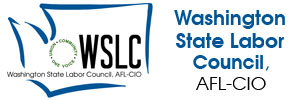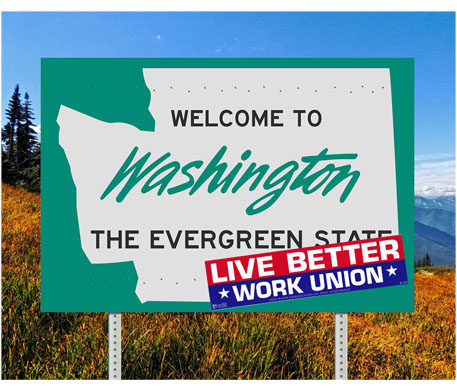 One of the services the Washington State Labor Council, AFL-CIO provides its affiliated unions is legislative education and advocacy. As with collective bargaining, by joining forces and speaking with a united voice on public policy issues affecting working families, labor has greater influence. There are more than 500,000 union members in Washington — 16.5% of the non-agricultural workforce — ranking us as the 3rd most unionized state in the nation. With few exceptions, the positions taken by the WSLC are on issues affecting ALL working people, not just union members. From the equal pay to minimum wage to workers’ compensation, the WSLC is proud to advocate for rank-and-file union members and for all working families.
One of the services the Washington State Labor Council, AFL-CIO provides its affiliated unions is legislative education and advocacy. As with collective bargaining, by joining forces and speaking with a united voice on public policy issues affecting working families, labor has greater influence. There are more than 500,000 union members in Washington — 16.5% of the non-agricultural workforce — ranking us as the 3rd most unionized state in the nation. With few exceptions, the positions taken by the WSLC are on issues affecting ALL working people, not just union members. From the equal pay to minimum wage to workers’ compensation, the WSLC is proud to advocate for rank-and-file union members and for all working families.
2024 Legislative Report & Voting Record
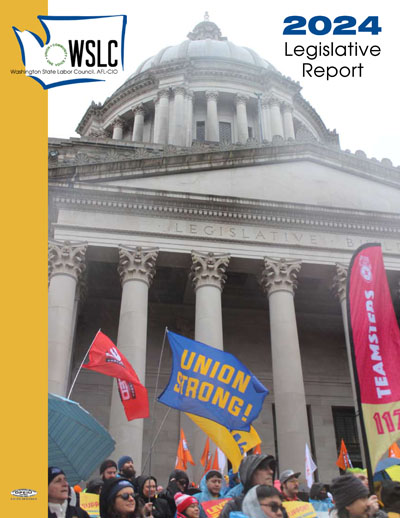 The 2024 edition of the Washington State Labor Council’s Legislative Report is now available. (Download the full 18-page PDF.) This annual report summarizes the fate of legislation affecting working families in each year’s session of the Washington State Legislature, and how each legislator voted on these issues. (You can also download the WSLC 2024 Voting Record only.) As always, many union members came to Olympia during the 2023 session to share their personal stories at hearings, or meet with their legislators, or demonstrate outside the State Capitol. As documented in this report, their voices were heard on a number of important issues. Rank-and-file labor activism continues to be the key to successfully advancing pro-worker policies.
The 2024 edition of the Washington State Labor Council’s Legislative Report is now available. (Download the full 18-page PDF.) This annual report summarizes the fate of legislation affecting working families in each year’s session of the Washington State Legislature, and how each legislator voted on these issues. (You can also download the WSLC 2024 Voting Record only.) As always, many union members came to Olympia during the 2023 session to share their personal stories at hearings, or meet with their legislators, or demonstrate outside the State Capitol. As documented in this report, their voices were heard on a number of important issues. Rank-and-file labor activism continues to be the key to successfully advancing pro-worker policies.
Printed copies of the WSLC’s 2024 Legislative Report will soon be mailed to all affiliated unions and distributed at the 2024 WSLC’s COPE Convention in May and 2024 Constitutional Convention in July. Officers, staff and rank-and-file members of WSLC-affiliated unions can request additional copies.
Previous years’ Legislative Reports:
2013 — 2014 — 2015 — 2016 — 2017 — 2018 — 2019 — 2020 — 2021 — 2022 — 2023
Previous years’ WSLC Voting Records:
2003 — 2004 — 2005 — 2006 — 2007 — 2008 — 2009 — 2010 — 2011 — 2012 — 2013 — 2014 — 2015 — 2016 — 2017 — 2018 — 2019 — 2020 — 2021 — 2022 — 2023
For earlier WSLC Voting Records and/or WSLC Legislative Reports, email Sarah Tucker.
2024 WSLC Legislative Agenda
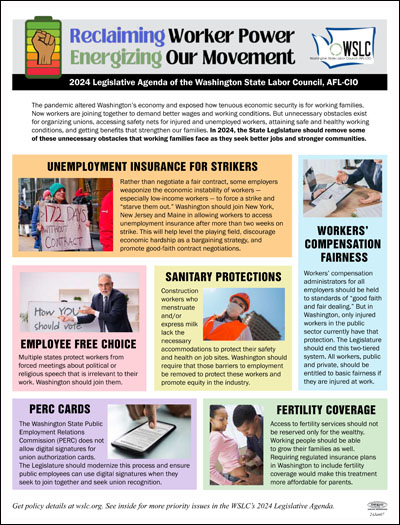 The pandemic altered Washington’s economy and exposed how tenuous economic security is for working families. Now workers are joining together to demand better wages and working conditions. But unnecessary obstacles exist for organizing unions, accessing safety nets for injured and unemployed workers, attaining safe and healthy working conditions, and getting benefits that strengthen our families. In 2024, the Washington State Legislature should remove some of these unnecessary obstacles. See the WSLC’s 2024 Legislative Agenda. In addition to what appears in this agenda, the WSLC will be supporting other legislation that is championed by its affiliated unions and a range of issues to address economic opportunity and justice. For more information about some of the priority legislative proposals supported by the WSLC, see the following fact sheets:
The pandemic altered Washington’s economy and exposed how tenuous economic security is for working families. Now workers are joining together to demand better wages and working conditions. But unnecessary obstacles exist for organizing unions, accessing safety nets for injured and unemployed workers, attaining safe and healthy working conditions, and getting benefits that strengthen our families. In 2024, the Washington State Legislature should remove some of these unnecessary obstacles. See the WSLC’s 2024 Legislative Agenda. In addition to what appears in this agenda, the WSLC will be supporting other legislation that is championed by its affiliated unions and a range of issues to address economic opportunity and justice. For more information about some of the priority legislative proposals supported by the WSLC, see the following fact sheets:
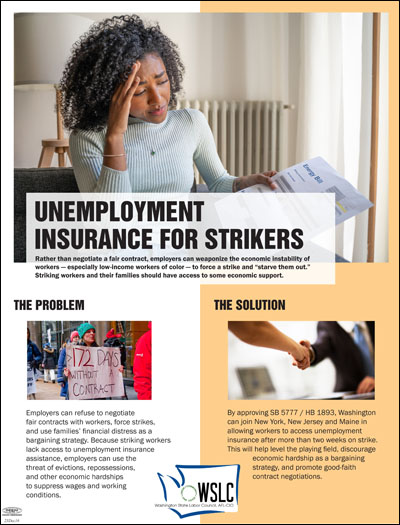 Unemployment Insurance for Strikers — Rather than negotiate a fair contract, some employers weaponize the economic instability of workers — especially low-income workers — to force a strike and “starve them out.” Washington should join New York, New Jersey and Maine in allowing workers to access unemployment insurance after more than two weeks on strike. HB 1893 / SB 5777 will help level the playing field, discourage economic hardship as a bargaining strategy, and promote good-faith contract negotiations.
Unemployment Insurance for Strikers — Rather than negotiate a fair contract, some employers weaponize the economic instability of workers — especially low-income workers — to force a strike and “starve them out.” Washington should join New York, New Jersey and Maine in allowing workers to access unemployment insurance after more than two weeks on strike. HB 1893 / SB 5777 will help level the playing field, discourage economic hardship as a bargaining strategy, and promote good-faith contract negotiations.
Employee Free Choice Act — Multiple states have created protections against “captive-audience meetings,” which corporations use as a union-busting tactic or to force their political and religious views upon employees. Washington should join them by passing HB 1940/SB 5778.
Workers’ Compensation Fairness — Workers’ compensation administrators for all employers should be held to standards of “good faith and fair dealing.” But in Washington, only injured workers in the public sector have that protection. Passing HB 2168 / SB 5991 would end this two-tiered system. All workers, public and private, should be entitled to basic fairness if they are injured at work.
Sanitary Conditions in Construction — Construction workers who menstruate and/or express milk lack the necessary accommodations to protect their safety and health on job sites. Washington should pass HB 2266/SB 6107 to remove those barriers to employment, protect these workers, and promote equity in the industry.
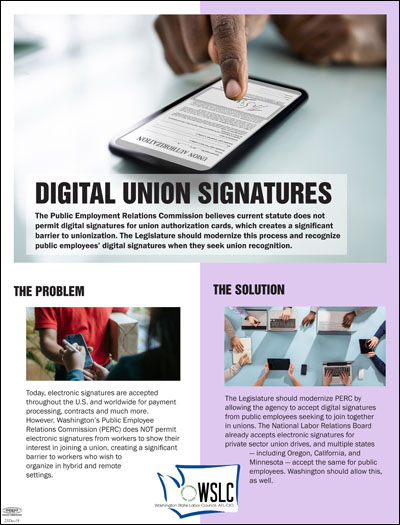 PERC Cards: Digital Union Signatures — The Washington State Public
PERC Cards: Digital Union Signatures — The Washington State Public
Employment Relations Commission (PERC) does not allow digital signatures for union authorization cards. Approving SB 6060 would modernize this process and ensure public employees can use digital signatures when they seek to join together and seek union recognition.
Fertility Coverage — Access to fertility services should not be reserved only for the wealthy. Working people should be able to grow their families as well. HB 1151/SB 5204 requires regulated insurance plans in Washington to include fertility coverage so this treatment is more affordable for parents.
For updates about the status of these bills — and Action Alerts explaining how you can help support their passage — subscribe to The STAND. You can also see an archive of all the legislative news in The STAND’s State Government section.
